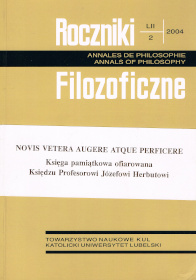The Thought of Gottlob Frege in the Light of Inquiries Conducted in Contemporary Philosophy
Abstract
The paper introduces the reader to the contemporary trends in the interpretation of Frege's thought. The point of departure in this description points out that the way of looking at Frege's accomplishment depends on the manner of characterising contemporary philosophy, in particular analytical philosophy. In order to have a closer look at the above relationship we have outlined the style of historical-systematic studies as proposed by Dummett. A series of historical facts are given with a view to explain the sources of the renaissance of Frege's thought in contemporary philosophy. A description of various interpretations of the thoughts of Frege is given in line with four oppositions which appeared in contemporary literature: 1) genius – continuator; 2) epistemologist – philosopher of language; 3) theorist of meaning – theorist of thought; 4) anti-naturalist – realist. Noticing the drawbacks of the above characterisation, an alternative historical reconstruction is proposed. This proposal consists in distinguishing a basic category or object whose inquiries have become important and dominated various kinds of philosophical enterprise in a certain philosophical period. The category of proposition have been chosen to be such an object. At the same time, it is pinpointed that owing to this choice one may characterise Frege's accomplishment and explain from many points of view the sources of the relationship between Frege's thought and analytical philosophy.
Copyright (c) 2004 Roczniki Filozoficzne

This work is licensed under a Creative Commons Attribution-NonCommercial-NoDerivatives 4.0 International License.





